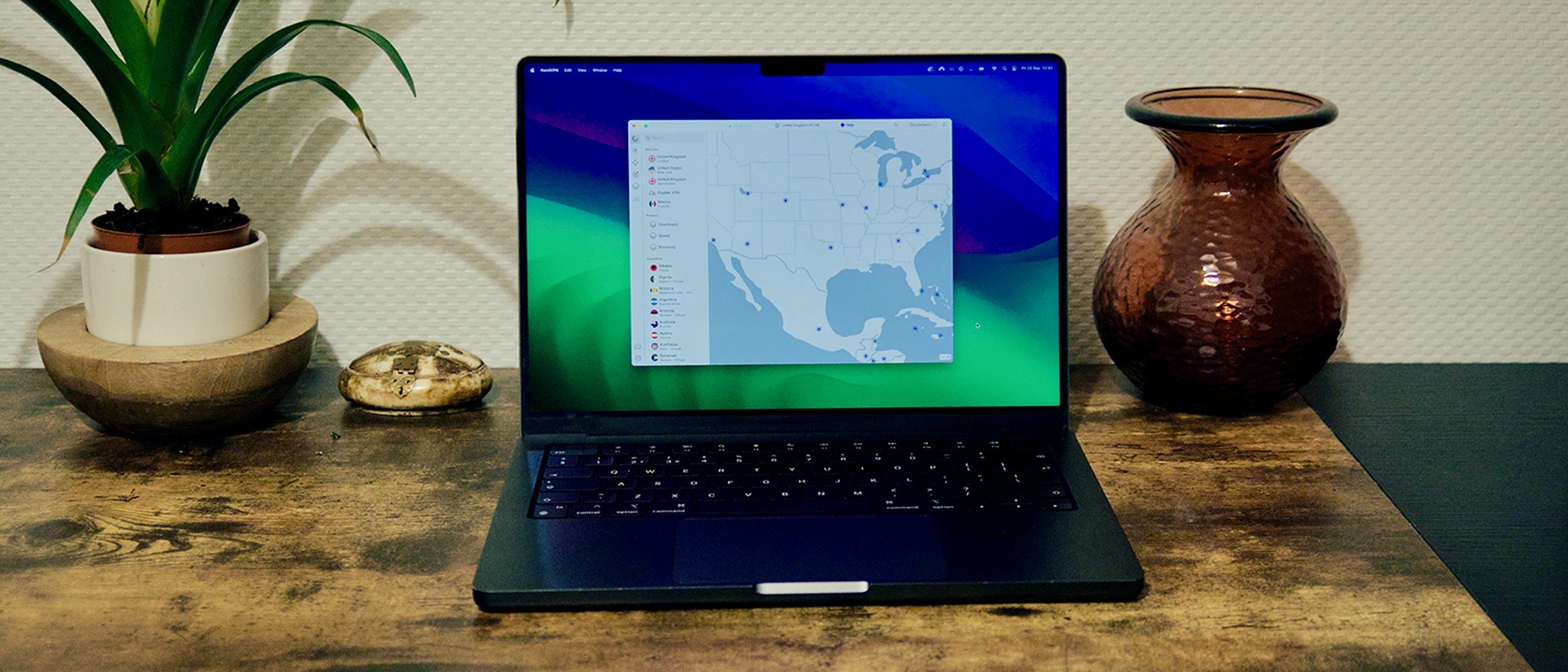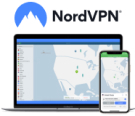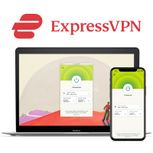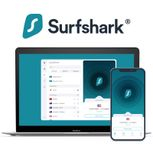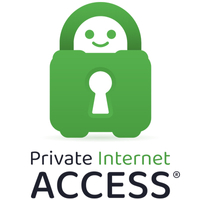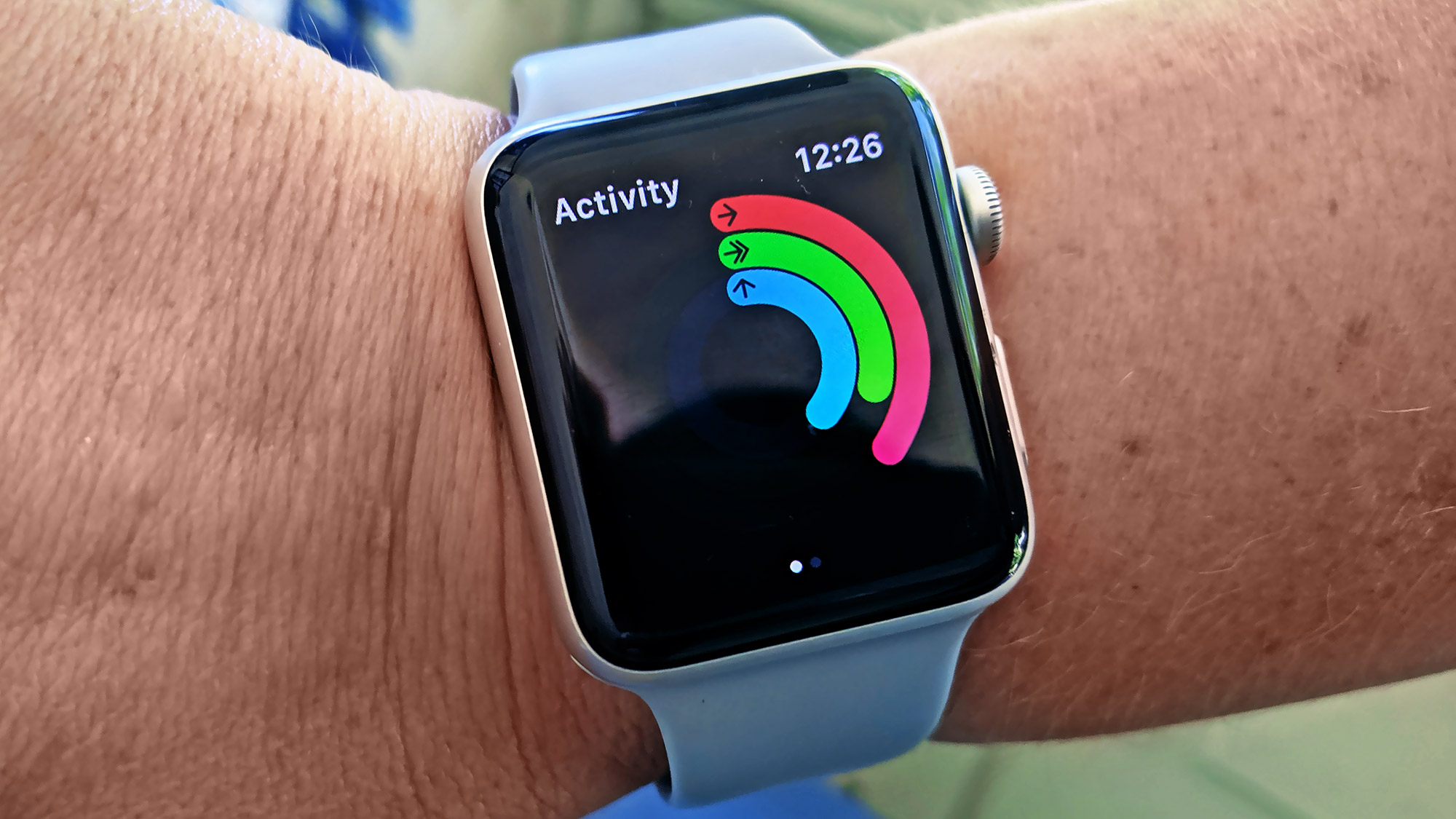Tom's Guide Verdict
NordVPN is hugely well-known, and it's a rare case in which a product's performance actually matches up to its lofty marketing claims. The apps are stable and offer excellent privacy across tons of devices, it's one of the fastest VPNs I've tested, and it can also unblock a huge range of streaming services around the world. In use, NordVPN may be a little complex for absolute beginners, but overall, it's the best VPN available right now.
Pros
- +
The most comprehensive VPN and privacy suite I've tested
- +
Stable speeds of over 950 Mbps
- +
Fully audited no-logging policy (collects no personal data on you)
- +
Apps for tons of devices
- +
Class-leading streaming unblocking performance
- +
Extras like Threat Protection Pro and cyber insurance are useful
- +
Great live chat support
- +
Meshnet is innovative and very useful
Cons
- -
Mobile apps are a little cramped
- -
Most add-ons require upgrading to a more expensive plan
- -
Price hike on renewal
- -
No Linux GUI
Why you can trust Tom's Guide
Unless you've been living under a rock for the past 10 years, you're likely to have at least heard of NordVPN. Arguably the market leader when it comes to consumer VPNs, NordVPN has made a name for itself as the go-to provider of privacy services for individuals – and thankfully it delivers on that promise.
Based in Lithuania and operating out of Panama – we'll explore why later on – the billion-dollar company has been expanding its offering from a garden-variety VPN into a full privacy and security suite over the last few years.
In this NordVPN review, I'll outline every aspect of our in-house testing of the core VPN service, including speed, privacy, app quality and more. I'll also include our data on NordVPN's built-in malware and phishing blocking tool Threat Protection Pro, run down what price you can expect to pay for all of this, and how it compares to a number of the best VPNs available today.
NordVPN on paper
Number of servers | 7,300+ |
Server countries | 117 |
Supported platforms | Windows, Mac, Android, iOS, Linux, Fire TV, Android TV, Xbox & PlayStation (SmartPlay Smart DNS), Chrome, Firefox |
Simultaneous connections | 10 |
Protocols supported | NordLynx (WireGuard), OpenVPN UDP & TCP |
Country of registration | Panama |
Support | 24/7 live chat, knowledgebase, email, in-app ticket |
Lowest monthly price | $3.09 per month |
For a quick explanation of any VPN-related terminology, check out our VPN glossary.
NordVPN's latest features and updates
- Standalone NordProtect cyber insurance launched in March 2025
- Source code, app, and extension audit undertaken in March 2025
- Fifth no-logs audit undertaken in February 2025
- Censorship-beating NordWhisper protocol launched in January 2025
- Post-quantum encryption launched in October 2024
- Arm-native app introduced for Snapdragon PCs in October 2024
NordVPN review: pricing (USD)
Plan length | Overall cost | Monthly cost |
1 month | $12.99 | $12.99 |
1 year | $59.88 | $4.99 |
2 years | $74.16 | $3.09 (varies) |
NordVPN occupies the middle ground when it comes to pricing – it's not the cheapest VPN, but it's by no means the most expensive either.
One-month subscriptions start at $12.99 on the Basic plan, growing to $13.99 on the Plus plan and $15.99 on the Ultimate plan. Sign up for a year and prices drop to $4.99 per month, $5.99 per month, and $7.99 per month.
The best-value option is the two-year plan, which currently starts at $3.09 per month on the Basic plan, $3.99 per month on the Plus plan, and $5.99 per month on the Ultimate plan. These prices can vary depending on what VPN deals are on offer, but it rarely goes much above $3.50 per month on the best deal.
Be aware that you'll pay the whole lot up front, which means the Basic one-year plan will cost you $59.88, and the Basic two-year plan will cost you $74.16.
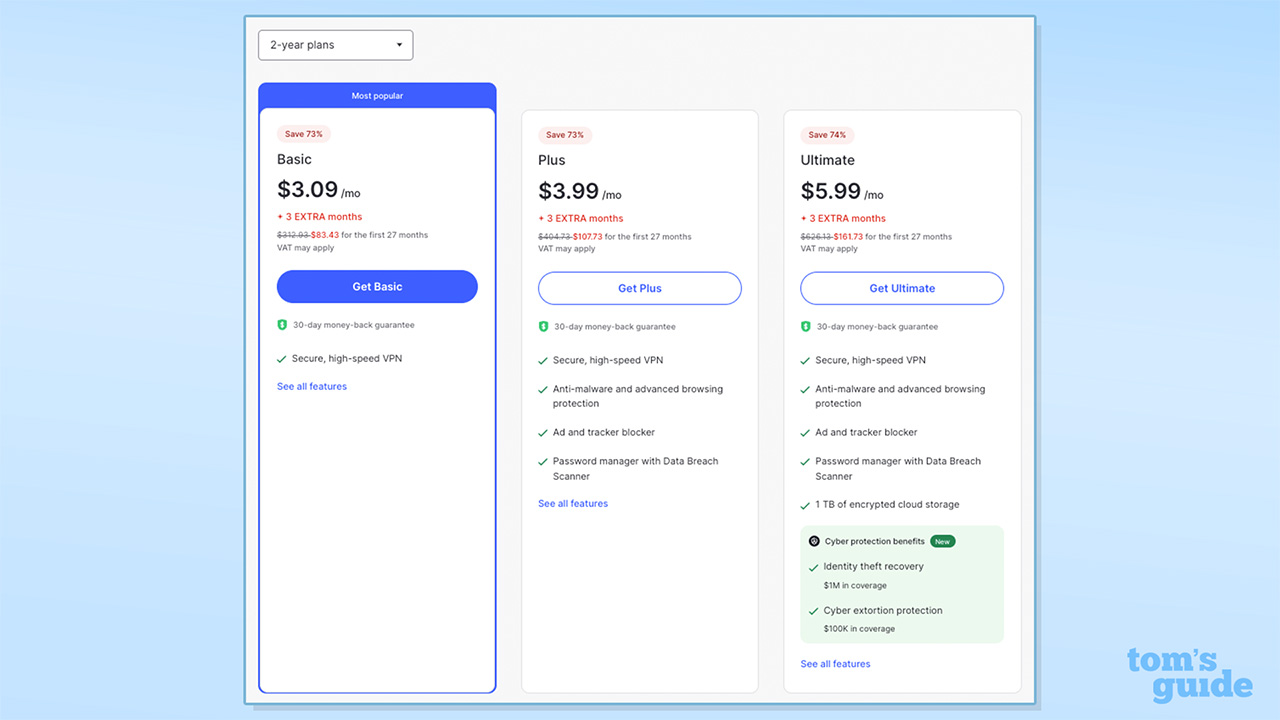
Something to be aware of is that NordVPN offers these cheaper prices to readers of certain websites, including Tom's Guide, and also employs a timer which artificially inflates the price after a few hours once you've visited the website. If you head through from Google, you may see prices of up to $4.49 per month – which certainly doesn't sound quite as appealing.
To make sure you get the best price – whatever website you choose to be referred from – open the link in Incognito mode. This ensures you'll get the cheapest price by looking like a brand-new customer. Also, be aware that there's a hefty price hike if you turn on auto-renewal, so I recommend unchecking this box and manually renewing when the time comes.
To make sure you get the best price, open the referral link in Incognito mode.
All plans also come with a 30-day money-back guarantee, which means you can test it out for up to a month to make sure that you enjoy the product before committing. In my experience, it's fairly easy to claim your refund too – all you need to do is get in contact through the live chat on the website, and make your way through a couple of questions intended to help you change your mind. There's not too much fuss to get your money back, which is often a worry with this sort of refund.
Payment options include credit card, prepaid card, PayPal, UnionPay, AmazonPay, GooglePay and iTunes. However, privacy fans will be pleased to know that Nord takes crypto payments (through CoinPayments), and accepts Bitcoin, Bitcoin Cash, Monero, Ethereum and a whole host more.
Overall, when you consider what you get, both Basic and Plus plans are great value. The Ultimate tier won't appeal to everyone, but if you're interested in cyber insurance, it's worth investing in. However, bargain hunters may prefer Surfshark or Private Internet Access – both of these hover around the $2-per-month mark, and are very good products in their own right.
Rating: 9/10
Does NordVPN have a free trial?
If you want a VPN free trial, you can bag 7 days free on Android and iOS. However, if you really want to test out the service and see if it’s right for you, I'd recommend signing up to a paid plan and then using the 30-day money-back guarantee if it doesn’t work out. You won’t be out of pocket, and you’ll have a whole month to make up your mind.
NordVPN review: features
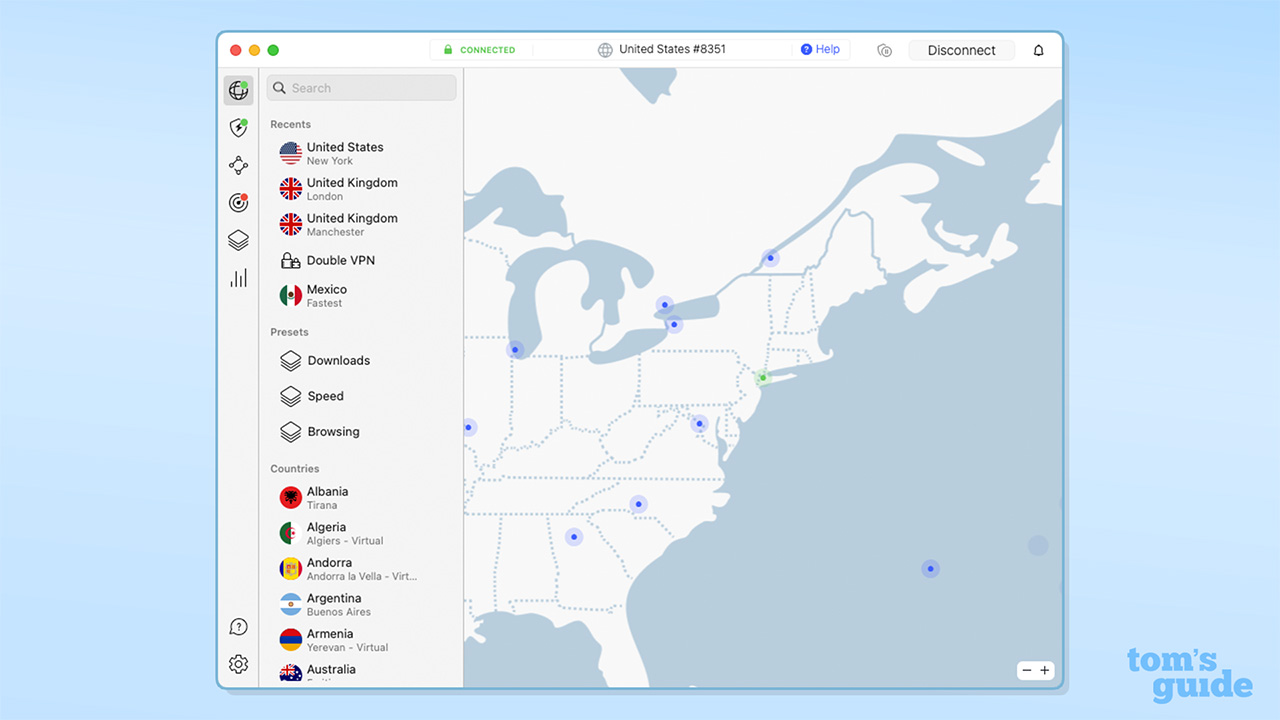
NordVPN's feature-set is comprehensive, and has all the must-haves you'd expect from a VPN. Essentials like plenty of servers worldwide, adjustable encryption (WireGuard and OpenVPN are available) and a kill switch are present, while the Windows VPN, macOS VPN and Android VPN also offer split tunneling.
Meshnet is a very interesting feature, which is free for everyone. Essentially, you can create an private, encrypted network with up to 60 devices. This is great for gaming, sharing files, and accessing your other devices when you're out of the house.
A darkweb monitor allows you to keep an eye on the latest password breaches, and you can also purchase a dedicated IP for $3.69 per month.
NordVPN caters well for those with a lot of different devices, offering 10 simultaneous connections and a huge range of apps. If your desired device doesn't have a dedicated app, you can also install NordVPN as a router VPN, although this isn't quite as simple a process as with ExpressVPN's Aircove. Some rivals such as Surfshark and Private Internet Access offer unlimited simultaneous connections – so if you're planning on sharing with your friends or family, they could be a better choice.
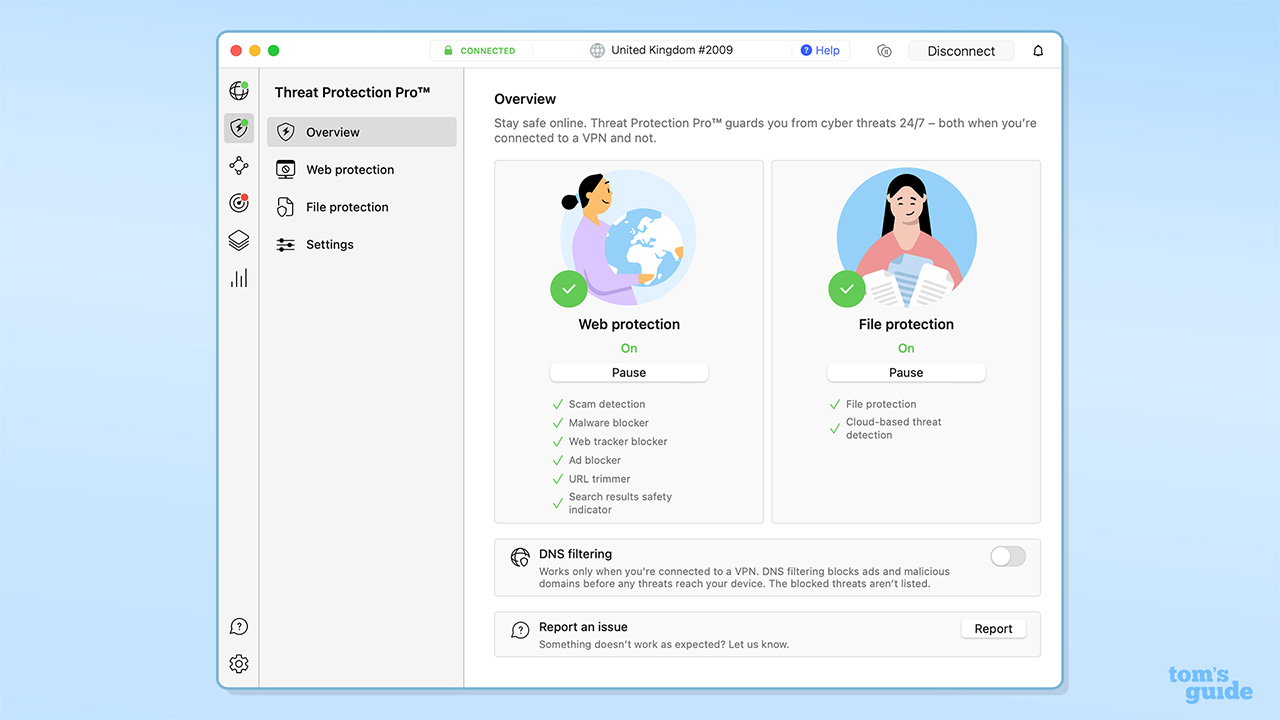
Higher tiers of subscription get you Threat Protection Pro, which is a more advanced version of the malware and phishing blocking software included in Nord's mobile VPN apps. We use anti-phishing experts OpenPhish to test VPNs, with 100 brand-new malicious URLs. NordVPN blocked 79% of malware sites, and 87% of phishing sites.
In comparison, dedicated antivirus software Bitdefender blocked 89% of phishing sites. That isn't significantly better, especially considering Threat Protection Pro isn't NordVPN's main product.
NordVPN's Threat Protection Pro blocked 79% of malware sites, and 87% of phishing sites.
Compared with NordVPN's mobile-based Threat Protection Lite (24% malware blocked, 34% phishing blocked) and Proton VPN's NetShield (11% malware blocked, 19% phishing blocked), it's clear that NordVPN is leading the way when it comes VPNs protecting their users beyond simple encryption – but it is a premium add-on that costs around $0.90 per month.
Speaking of premium add-ons, the Plus plan includes the VPN, Threat Protection Pro, and the NordPass password manager – which scored 4/5 in our testing. The Ultimate plan adds a hefty 1 TB of encrypted cloud storage, and cyber insurance. This offers up to $1M in identity theft recovery, and $100K in cyber extortion protection.
Overall, there's not a lot missing from NordVPN's apps, and few VPNs can match it in terms of useful, easy-to-use features.
Rating: 9.5/10
NordVPN server network
Continent | Countries | Locations |
Europe | 47 | 56 |
North America | 17 | 38 |
South America | 10 | 10 |
Asia Pacific | 26 | 32 |
Africa | 18 | 18 |
A good number of servers in a wide range of locations is one of the key factors for ensuring a VPN's reliability. While it's not the be all and end all, it is a good indicator of the level of investment put into the VPN.
NordVPN's server network has been steadily growing, and currently sits at around 7,300 servers. These are spread over 154 locations in 118 countries.
Of all the top VPNs, this is one of the most comprehensive. Proton VPN offers more servers overall, but in slightly fewer countries (11,000 server in 117 countries), while Nord Security stablemate Surfshark and rival ExpressVPN both top out at around 3,000 servers, in 100 and 106 countries respectively.
NordVPN has a good amount of servers in each continent, too. The Americas and Europe predictably have the best coverage – there are servers in 48 North and South American cities, and 56 European cities.
The Asia Pacific region is also fairly well covered with servers in 32 cities, although not nearly as comprehensive as Europe.
Africa and the Middle East have servers in just 18 cities.
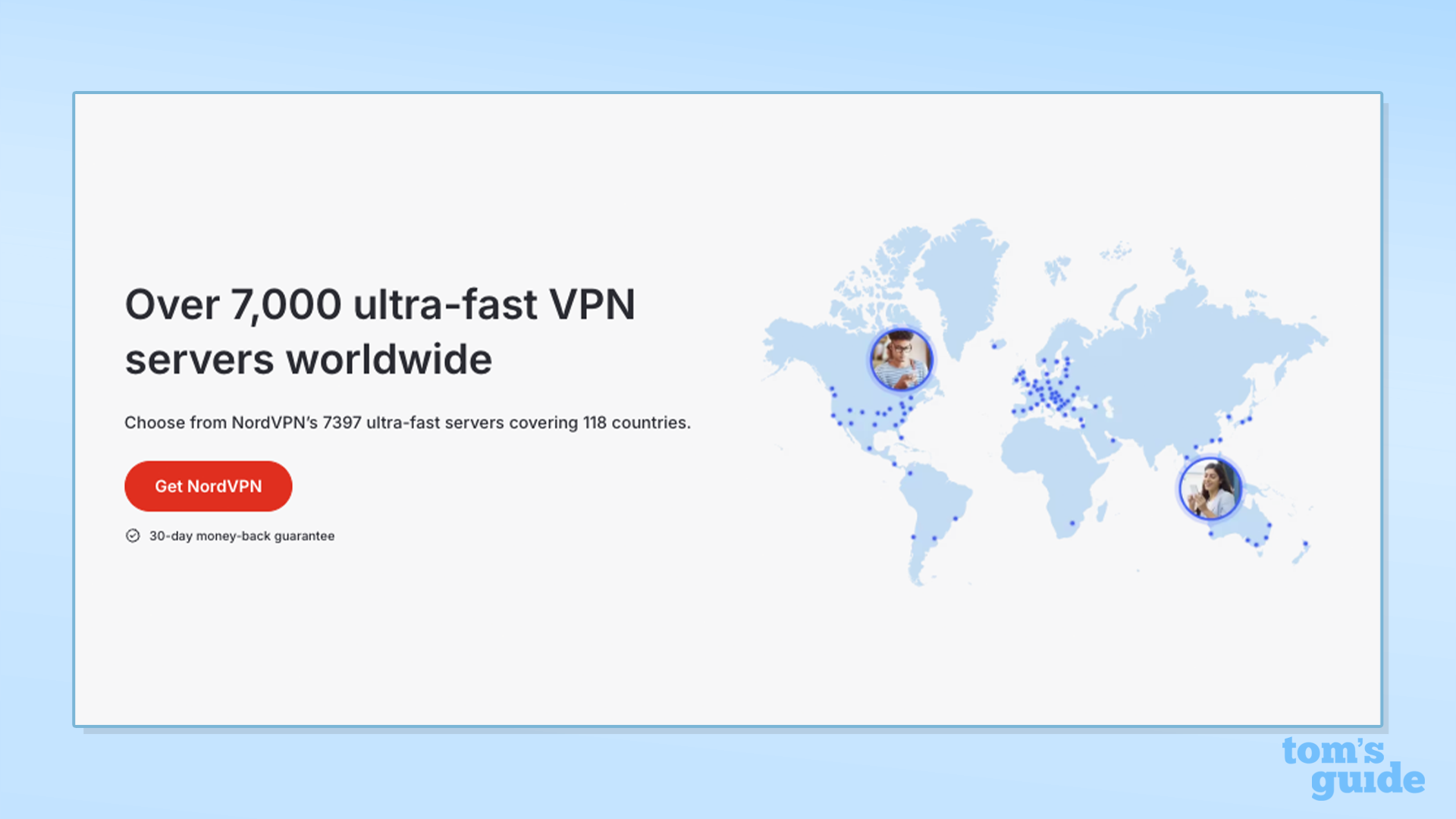
If you need a lot of servers in Asia or Africa, Proton VPN is a better choice. It has servers in 42 cities in the Asia Pacific region, and 22 in Africa.
It's worth noting that NordVPN does employ "virtual servers." These are commonly used to provide locations in less developed countries. For example, the physical server may be located in Europe, but provides an IP address in Iran.
If configured well – which NordVPN's are – the only downside of virtual servers is a potential decrease in connections speeds.
For the vast majority of people, NordVPN's server network will offer just about every location they could wish for – it's the most diverse VPN in terms of country coverage we'd recommend.
Rating: 9/10
Is NordVPN good for streaming and unblocking?
One of the most important parts of our VPN review process is testing how effective each provider is at unblocking streaming sites like Netflix, Disney Plus, BBC iPlayer, and more. Feel free to check out the details on how we test streaming VPNs.
Over the years, NordVPN has consistently proved to be one of the very best VPNs for streaming. In our latest round of testing, this stayed the same.
NordVPN has a long history of unblocking just about anything.
In short, NordVPN unblocked every site we tried, with every server we tried it with. This is very impressive, and although some other providers – notably Surfshark and Proton VPN – can do the same, NordVPN has the best track record here.
This means that wherever you are in the world, you can simply connect to any server in the required country, and head straight to the streaming site. There's no messing around with dedicated servers with NordVPN – they all just work.
On the few occasions in the past when we've had an issue a particular service or site, the live chat support generally has particular servers on hand to recommend. These are kept secret to avoid them being blocked, but ask the right questions and you'll get access to them.
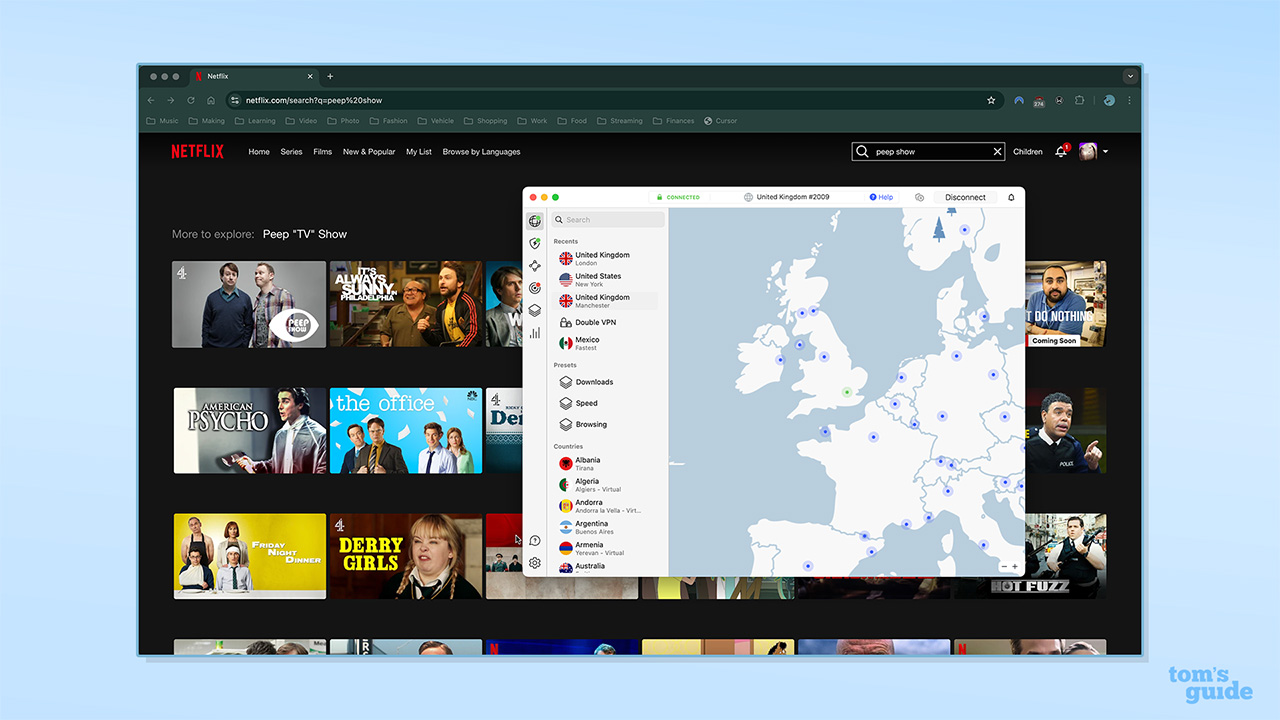
While NordVPN is a very capable VPN for torrenting, it's not quite the very best – that accolade goes to Private Internet Access.
This is because not every one of NordVPN's servers is configured to allow torrenting, and specialist features like port forwarding aren't available within the apps.
However, it's unlikely you'll run into any issues as a casual torrenter when using NordVPN. When the app detects torrenting traffic, it will automatically switch to a server that allows it – and this is usually undetectable.
So, while hardcore torrenters may want something more specialized, NordVPN will still keep you safe with its DNS leak protection, and offer good speeds when sharing P2P.
Rating: 9.5/10
NordVPN review: connection speed
Testing connection speeds is one of the most important parts of our VPN review process, but there are a few things to be aware of. Essentially, it's very difficult to accurately and fairly test a VPN's speed without having it connected all the time, constantly monitoring its performance.
We can't do that – although we do have a tool in the works that might change this – so the results we can offer you are snapshots in time. Your results may vary, but all the VPNs we review are tested in the same way, and our figures here should go some way to giving you a good idea of a VPN's capabilities.
Beyond a certain point, latency will have more of a tangible effect on your connection than download or upload speed.
We test each VPN's speeds 20 times in the morning, and 20 times in the evening on our 1 Gbps connection, testing connections from the UK to our automatically selected server, and then to a US server.
In an improvement to our previous testing process, we now also test upload speed, jitter, and latency alongside download speed. Beyond a certain point, download speeds are somewhat arbitrary as few people have a base connections that can go as fast as the VPN, and latency will have more of a tangible effect on your connection than anything else.
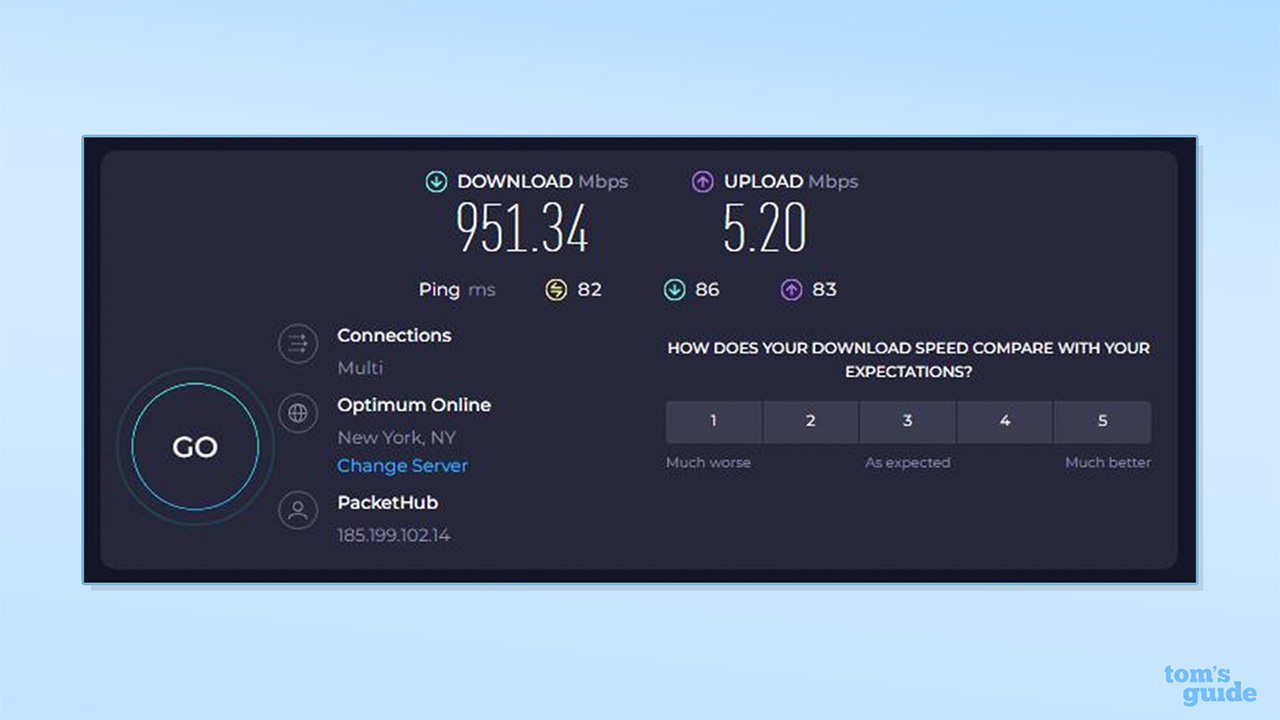
When using NordVPN's WireGuard-based NordLynx protocol, speeds are very good. In our UK test, in the morning, average speeds were 780 Mbps. In the evening it reliably maxed out our connection at over 950 Mbps, which is very impressive.
In our UK-US test, morning speeds averaged at around 440 Mbps, and evening speeds again maxed out our connection at over 950 Mbps. Compared to the competition, very few VPNs were faster in our last round of results, with only Proton VPN and Surfshark clocking marginally faster speeds in the morning, and similar speeds in the evening.
To put that into context, the average home in the US has speeds of around 100-200 Mbps, often marketed as "superfast" or "ultrafast." What's more, speeds of just 50 Mbps are all you need to stream 4K video, which is one of the most bandwidth-intensive activities, and standard-definition uses just 3 Mbps.
That means that in every test we undertook, NordVPN's NordLynx protocol was at least 10 times faster than you need to stream 4K – 20 times in most cases – and much faster than a domestic base connection is likely to be capable of.
NordVPN is 20 times faster than you need to stream 4K, and much faster than a domestic base connection is likely to be capable of.
Most people will just use NordLynx, but OpenVPN is still important to consider, especially for those with more specialist needs or those in countries that attempt to restrict VPN usage. We test OpenVPN in the same way – 20 tests, morning and evening.
When connected to our closest server, speeds varied between 109 and 173 Mbps. That's plenty fast for most uses, but other providers did deliver faster speeds – Surfshark topped out at an incredible 950 Mbps, and PIA at 257 Mbps. It's a similar story when connecting to a US server from the UK, with NordVPN delivering speeds of 98-159 Mbps.
Finally, when using NordLynx, NordVPN's upload speeds were impressive at 950+ Mbps, alongside a stable latency of around 20 milliseconds, and jitter of around 4. Latency is the most important one here, and 20 milliseconds is more than quick enough for effective gaming and the quick loading of webpages.
Overall, NordVPN is one of the fastest VPNs around when using NordLynx, and is still perfectly usable when using OpenVPN.
Rating: 9.5/10
NordVPN review: privacy and security
Discussing the privacy and security of a VPN can become very technical, very quickly. I'm going to delve into the details in this section, but I'll open up with some simpler statements to outline NordVPN's credentials beforehand.
In short, NordVPN is one of the most private VPNs out there. It has all the essential features like strong encryption (AES-256-GCM in this case), a kill switch (which cuts your connection if the VPN fails), and a no-logs policy to ensure nothing about you is stored by the provider. These three things are the bare minimum to look for in any VPN worth its salt, and NordVPN ticks these boxes with aplomb.
We have a number of tests for VPN kill switches, all of which are specially designed to make them fail and expose the user's original IP address. However, NordVPN's kill switch proved to be unbreakable, and it should protect you in any event.
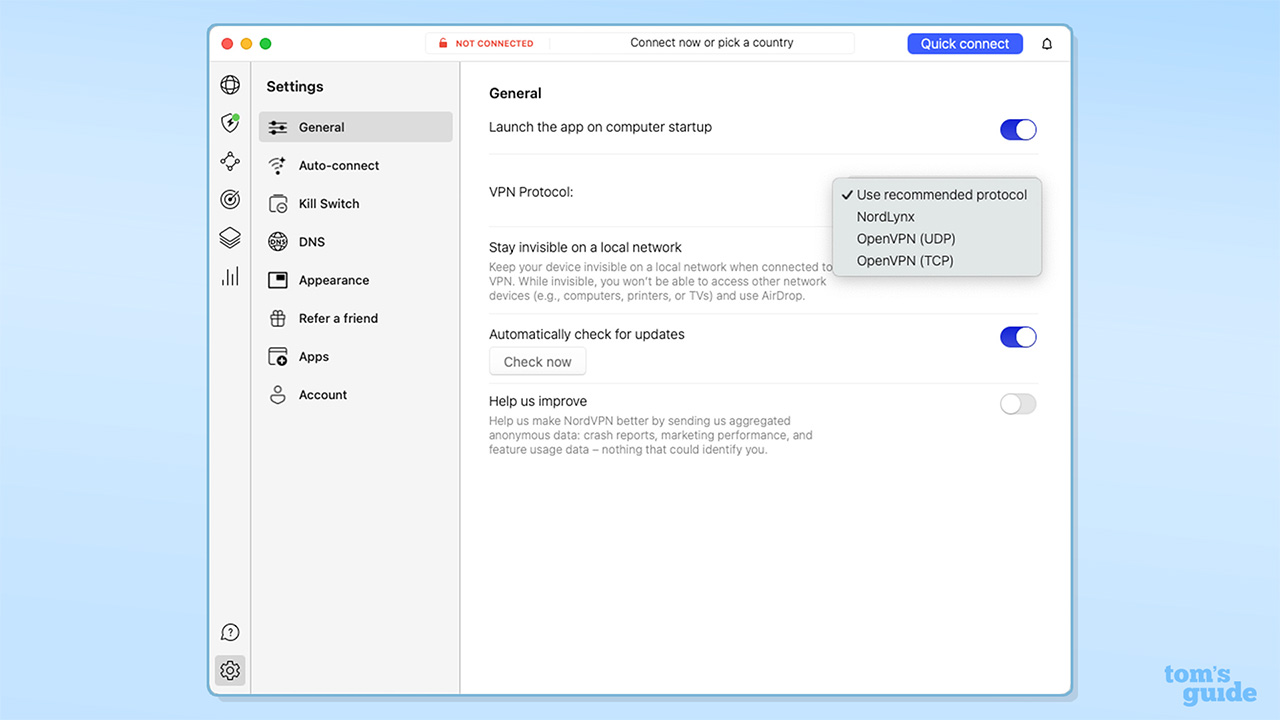
The automatic encryption protocol used is NordLynx, which is based on WireGuard. WireGuard is a fast, modern protocol that has largely taken over in the last few years, and is great for most daily applications – as evidenced by NordVPN's excellent speed results further up the page.. However, some features like obfuscation (hiding the fact you're using a VPN) are very difficult to achieve with WireGuard, and this is why NordVPN also offers OpenVPN as an option.
It's worth noting that since our last review, NordVPN has deprecated support for IKEv2 and SSTP due to NordLynx offering better performance and privacy. While some competitors do offer a wider range, except for incredibly niche cases there's no reason to use these older protocols, so this has a negligible impact on our scoring here.
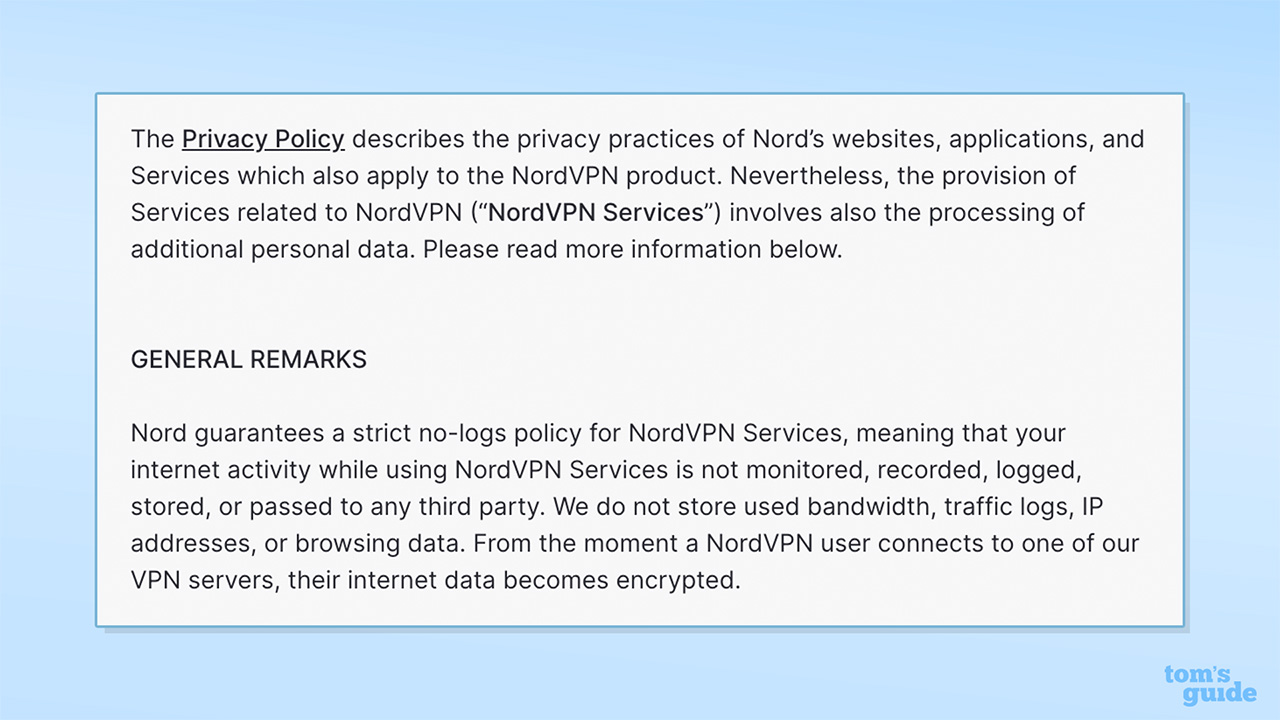
Referring back to the no-logs policy, NordVPN states: "Nord guarantees a strict no-logs policy for NordVPN Services, meaning that your internet activity while using NordVPN Services is not monitored, recorded, logged, stored, or passed to any third party. We do not store used bandwidth, traffic logs, IP addresses, or browsing data. From the moment a NordVPN user connects to one of our VPN servers, their internet data becomes encrypted."
In January 2024, NordVPN had its no-logs policy audited for the fourth time.
Privacy policies can't always be trusted, though, so it's good news that in January 2024, NordVPN had its no-logs policy audited for the fourth time. Essentially, this is a guarantee that NordVPN follows its own rules – which is non-negotiable when choosing a VPN. NordVPN has undergone other audits, too, including examinations of its apps, source code, servers, and infrastructure.
NordVPN does log a small amount of information, but this is just "encrypted login credentials (used for connecting to a VPN and troubleshooting purposes) and billing information (used for refund procedures)."
If you want to explore NordVPN's logging policy yourself, check out our guide on what to look for in a VPN logging policy.
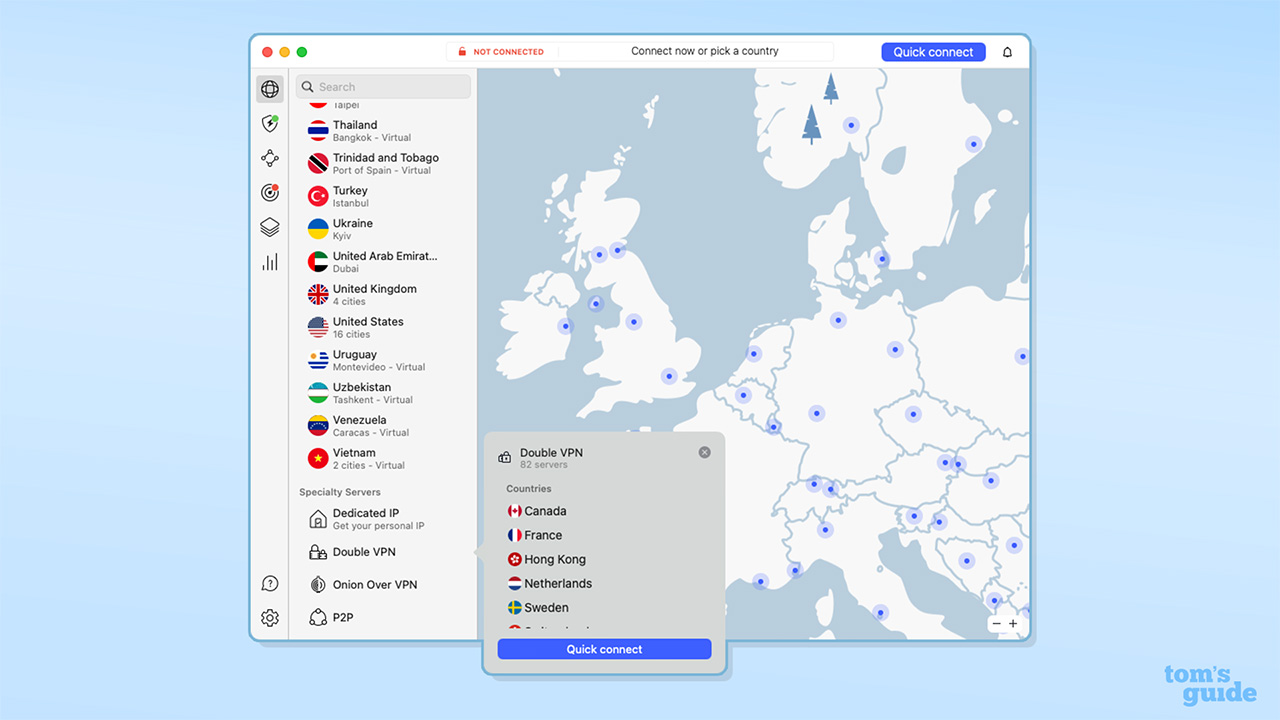
Beyond the basics, NordVPN goes a little further than many of its rivals. In its apps, you'll get the option of connecting to Double VPN and Onion over VPN servers, as well as regular servers. Double VPN routes you through two different locations to give additional protection, while Onion over VPN uses the Tor network to route your traffic.
Both of these settings are likely to be overkill for the vast majority of subscribers – and both impact connection speed – but it's excellent that they're available for those who need them.
There's very little for NordVPN to improve when it comes to privacy, with all features working flawlessly, and no glaring omissions present.
You'll also be protected by Perfect Forward Secrecy, which changes the encryption key used to decrypt your data every 15 minutes. This is a good failsafe feature, as even in the incredibly unlikely situation of your encryption key being compromised, the attacker will only get a maximum of 15 minutes of your data before it becomes unreadable again.
Finally, another standout privacy feature is the fact that NordVPN uses its own private DNS servers. This means that your information is never put into the hands of third parties at any time. NordVPN's apps also offer DNS leak protection, and our testing showed that it works well.
Overall, there's very little for NordVPN to improve when it comes to privacy, with all features working flawlessly, and no glaring omissions present.
Rating: 9/10
NordVPN review: apps
NordVPN has a wide range of apps, with options for just about every mainstream device. This includes:
- Windows
- macOS
- Linux
- iOS
- Android
- Apple TV
- Android TV
- Amazon Fire TV Stick
- Browser extensions (Chrome, Firefox, Edge)
The only negative to note about NordVPN's device support is the fact that the Linux app does not have a graphical user interface (GUI). This means that it needs to be controlled via command line.
For most Linux users, this isn't likely to be an issue – but the best Linux VPNs like Private Internet Access and Surfshark do offer a GUI on Linux.
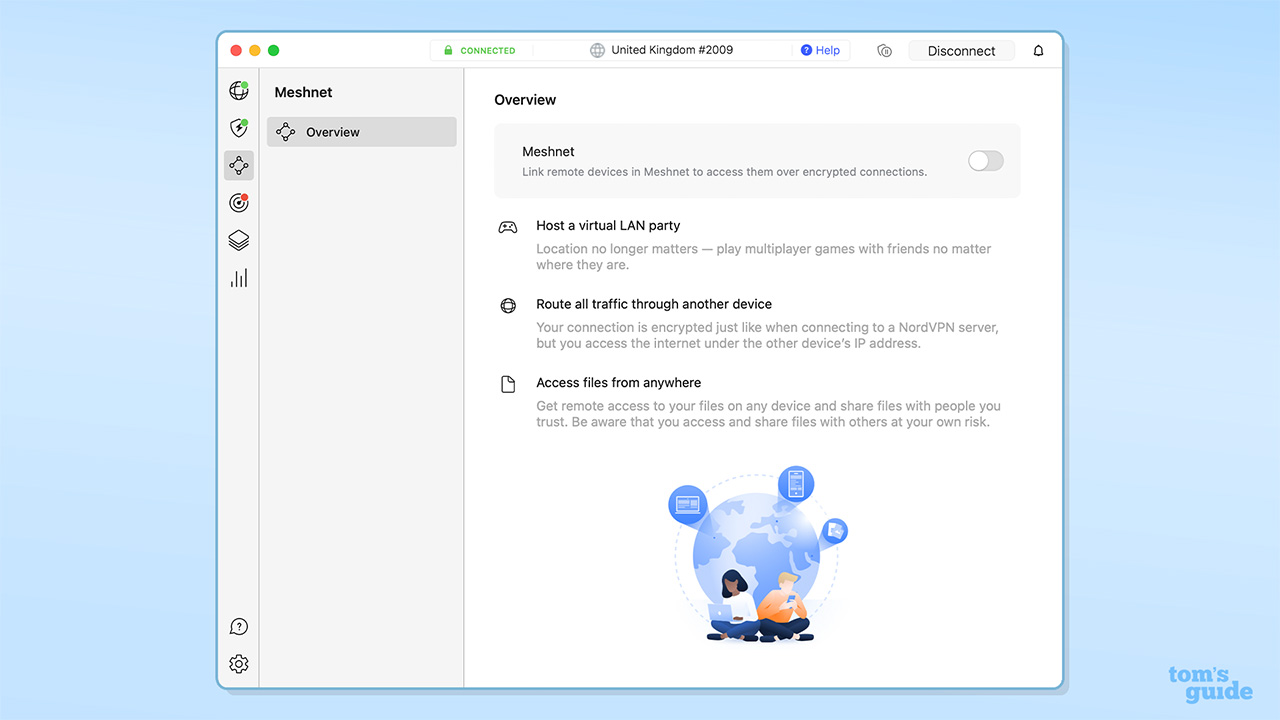
Image – Meshnet is a nifty tool that lets you create a private network of up to 60 devices, and share files between them
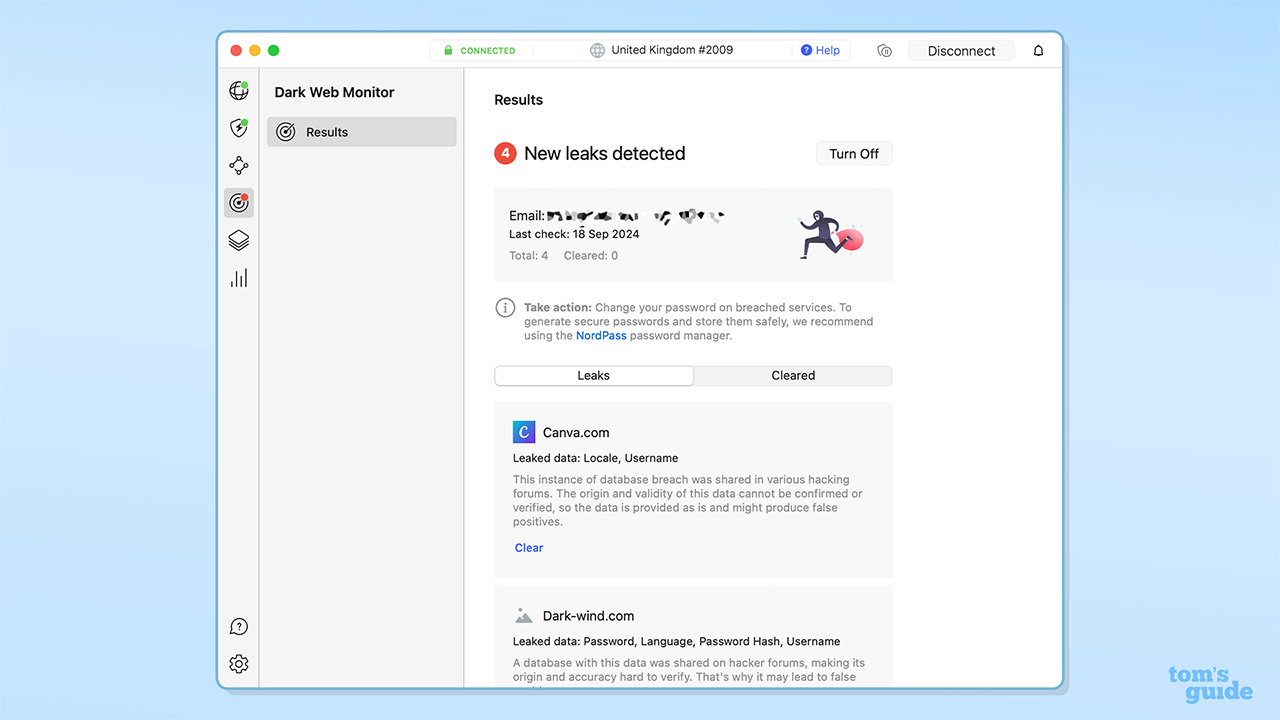
Image – Dark Web Monitor allows you to protect yourself from data breaches and leaks
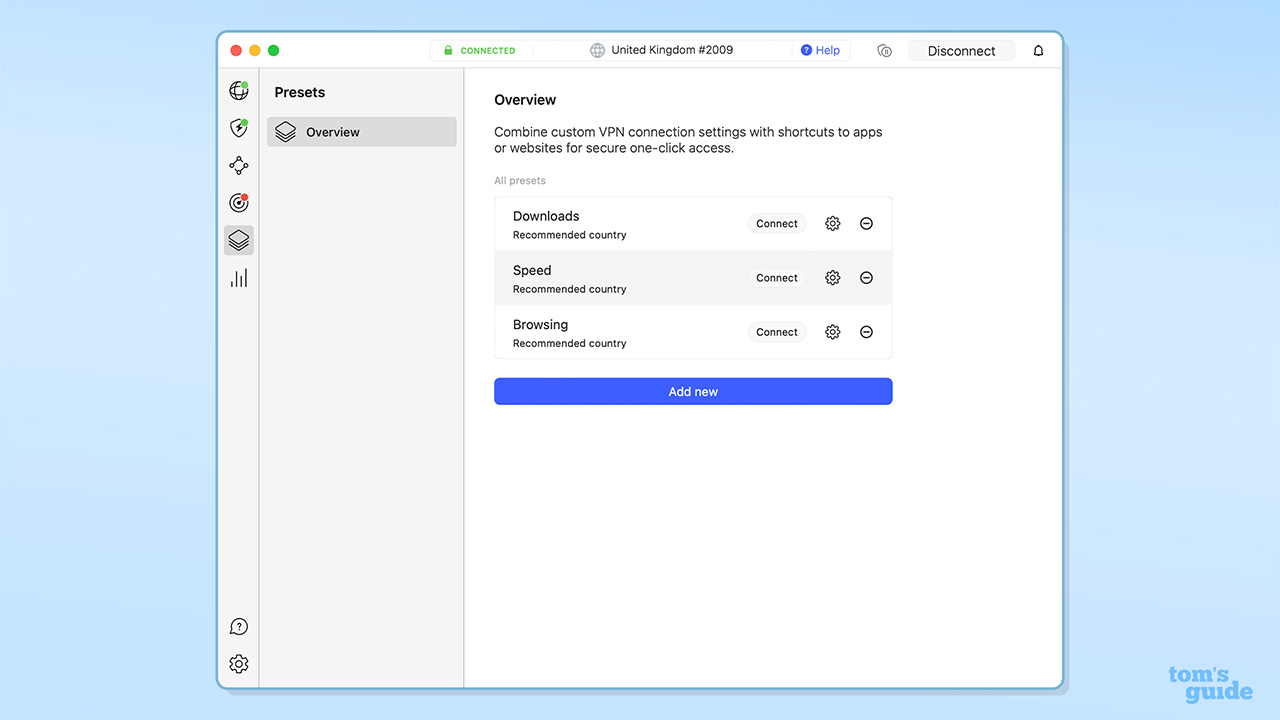
Image – Presets allow you to select which servers you use for certain tasks
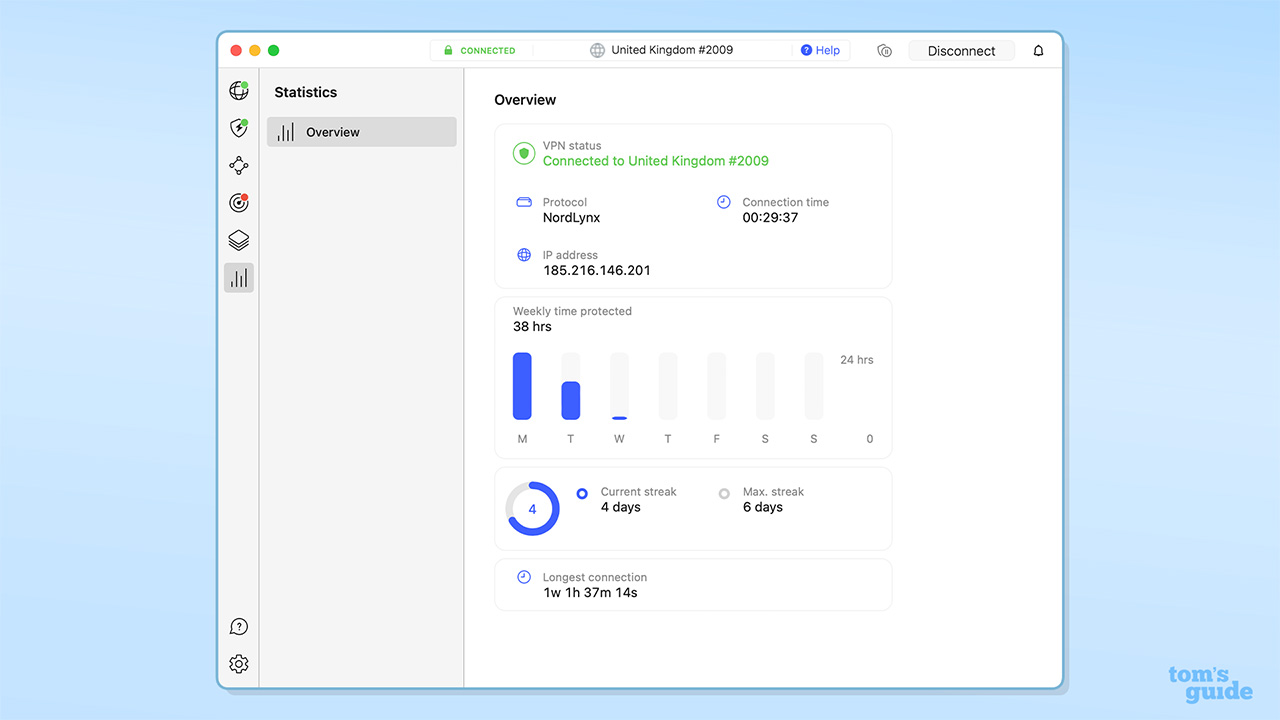
Image – You can check on your connection statistics as well
Other than the Linux version, NordVPN's apps are appealing and pleasant to use. However, unlike some rivals like ExpressVPN, there is some variation across platforms.
For example, the Fire Stick and Apple TV apps are much more basic than the desktop and mobile versions. You won't find the iconic NordVPN map on these devices. Rather, you'll simply be offered a range of flag icons to scroll through and select.
In terms of features, the desktop apps have the most options – with Windows being top of the pile – but the mobile apps are still plenty powerful.
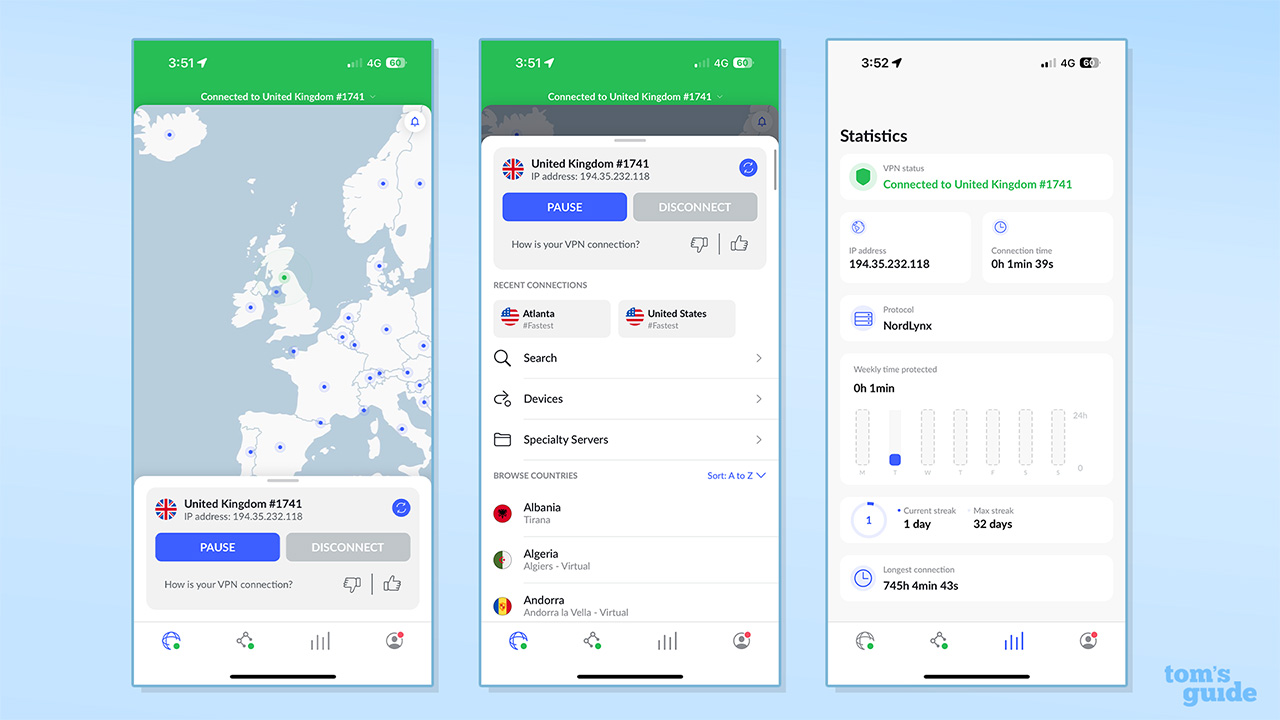
The biggest feature that the mobile apps lose out on is Threat Protection Pro. Instead, you get Threat Protection Lite.
This is due to the fact that the Pro version is URL-based, which is reportedly very difficult, or even impossible, to implement on mobile operating systems. Instead, the Lite version is DNS-based.
The upshot of this is that Threat Protection Lite is less effective at detecting malware and ads, and is only available when the VPN is switched on. Pro, however, is a much more powerful tool that runs around the clock, whether you're connected to the VPN or not.
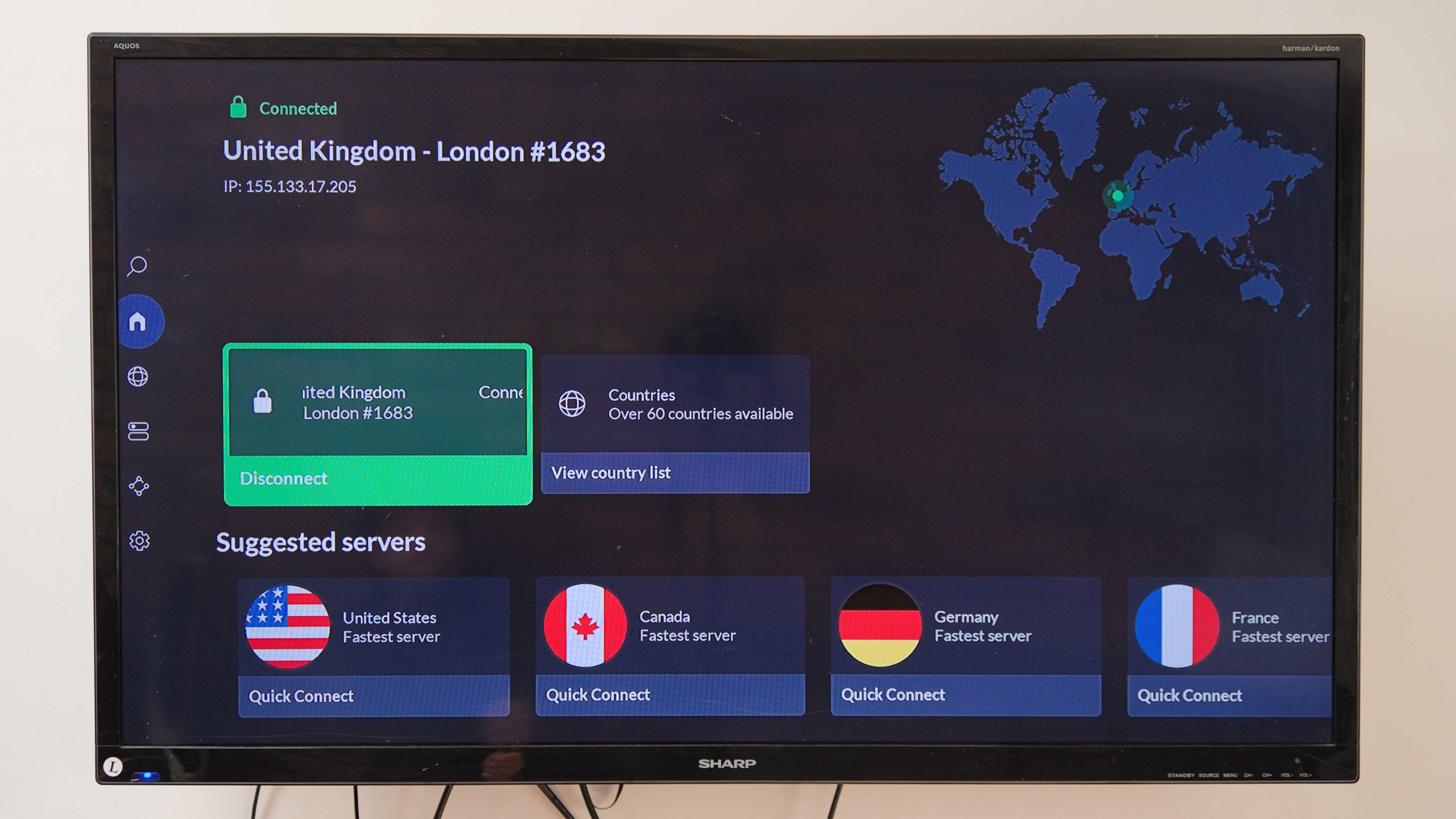
Image – NordVPN's Fire TV Stick app is laid out very differently
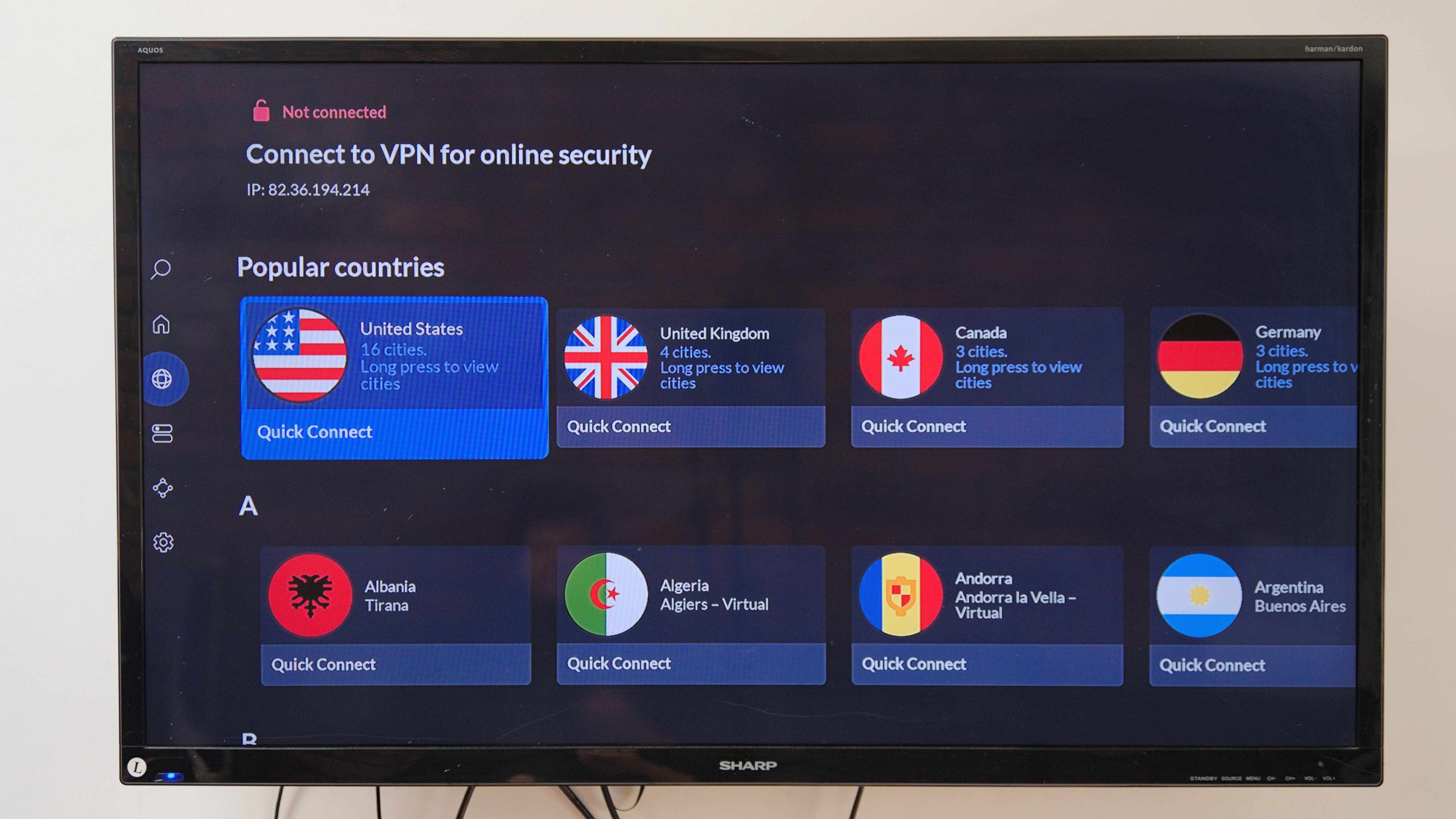
Image – Selecting a new location is simple
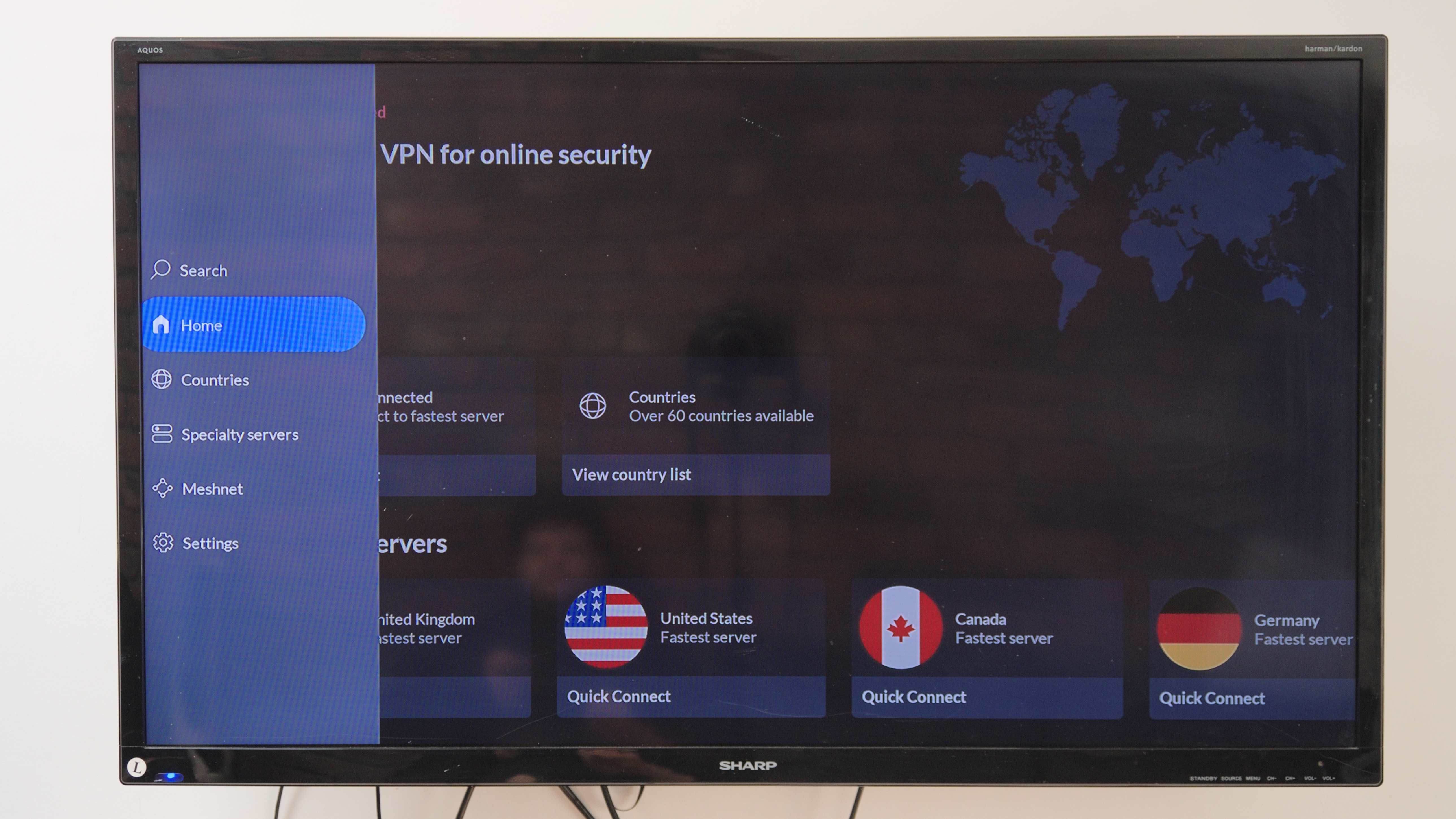
Image – There are plenty of features available
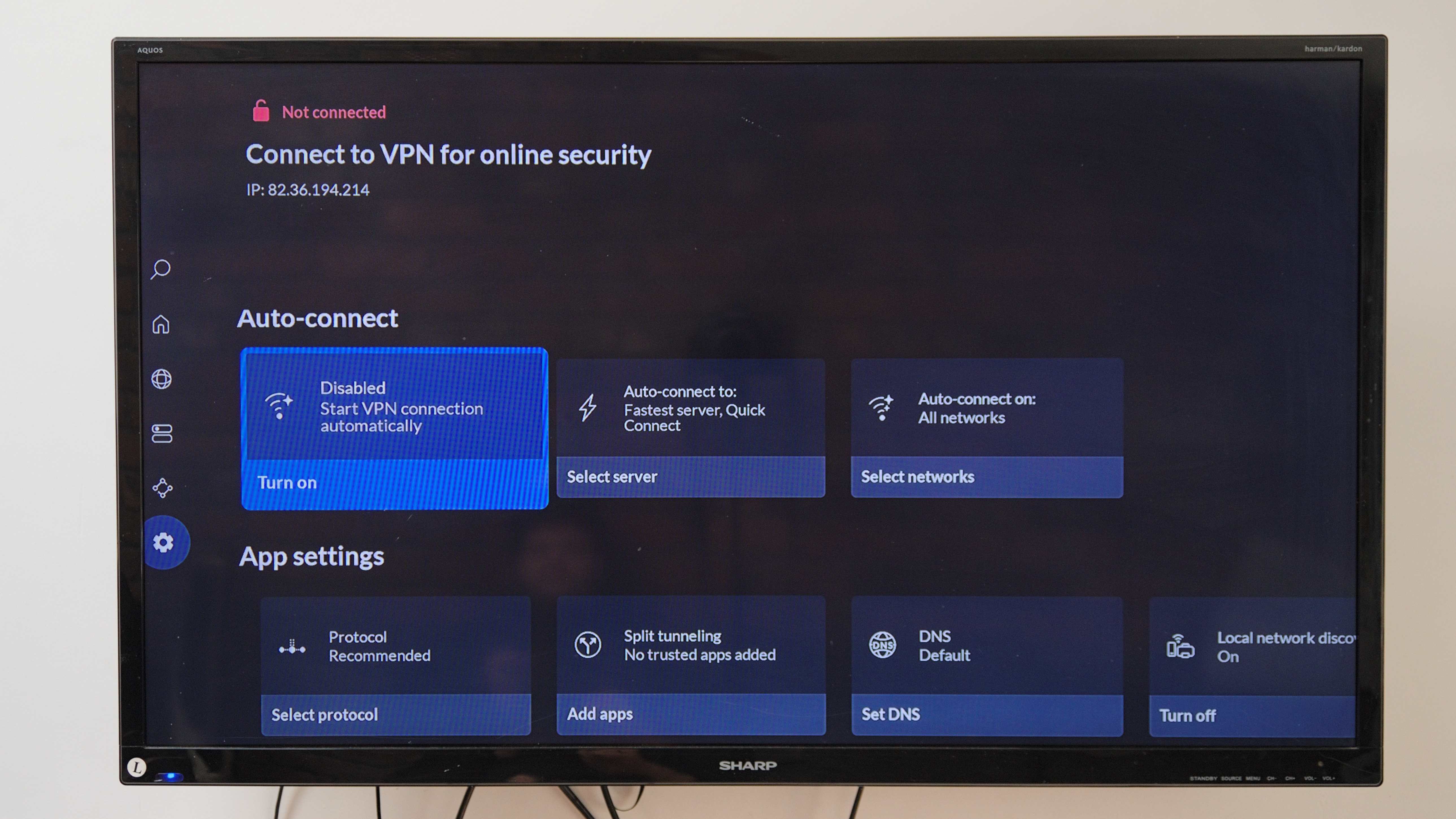
Image – Not a lot is left out despite the change in interface
A common feature that the iOS app doesn't have is split tunneling. This is widely regarded as very difficult to make work on iOS, but rival IPVanish has done so. We'd like to see this worked on in a future update.
A bonus for Apple users, though, is the inclusion of the all-important kill switch – something that ExpressVPN doesn't offer on iPhones.
During testing, all apps on every platform performed very impressively, with no detrimental effect to the speed of other apps, and no unexpected closures or crashes.
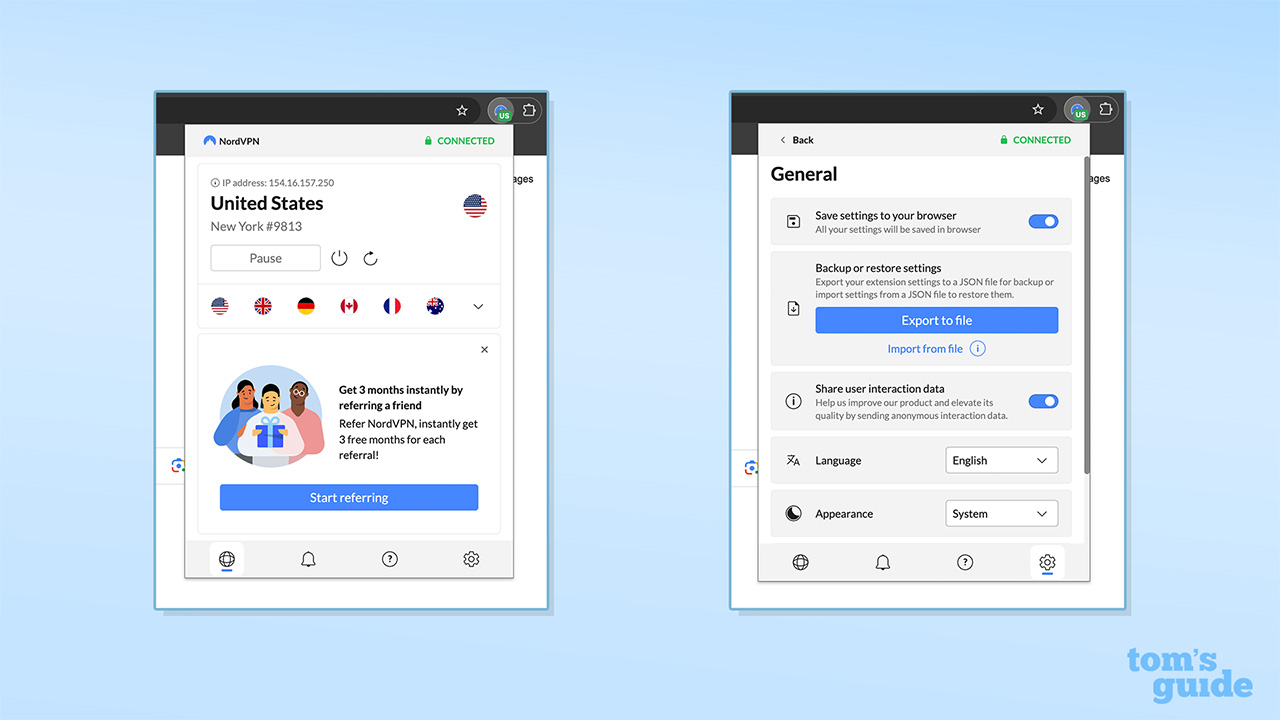
NordVPN also offers browser extensions. These are great if you can't install software directly on your device, which is a common practise with work laptops.
There are extensions available for Chrome, Firefox, and Edge, and they're remarkably powerful with features like split tunneling, a kill switch, and WebRTC blocking. In fact, we rate NordVPN as the second-best Chrome VPN extension.
However, unlike alternatives like Windscribe's free VPN extension, you do need to pay for a NordVPN subscription to use the extension.
Rating: 9/10
NordVPN review: ease of use
NordVPN is very simple to install. If you've ever installed any other software, the process is much the same – there's a simple wizard to guide you through the process, and you can get going in a couple of clicks.
The only thing out of the ordinary you'll encounter is giving the app permission to set up VPN connections. Depending on your operating system, you may be able to simply click "OK." Otherwise, you may need to head into your device's settings to enable this manually.
We also checked out the setup guides on the NordVPN website, and they proved to be helpful and comprehensive.
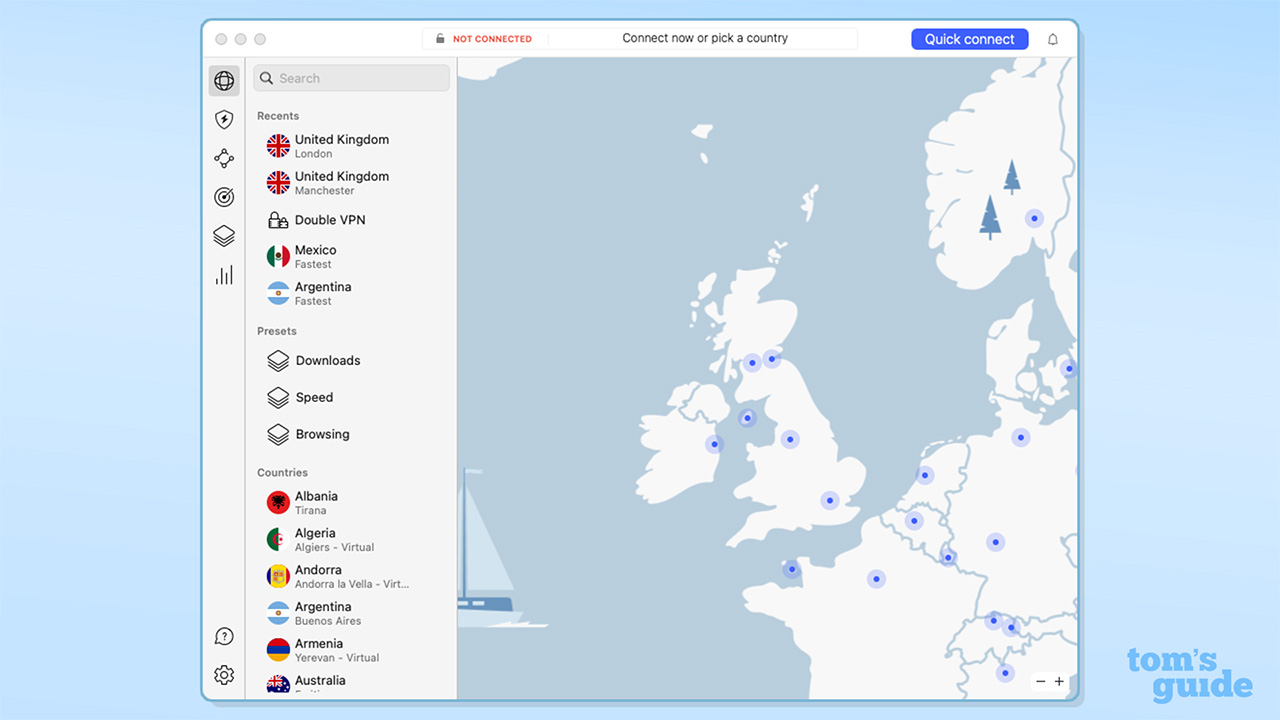
NordVPN's interface has gone through some changes over the decade-plus it's been around. The apps are a good middle ground between simplicity and extra features – it's not as stripped back as ExpressVPN's one-button design, but it's much simpler that Private Internet Access's plethora of options.
The desktop apps are dominated by a large map, which has server locations dotted around the world. You can click these and connect, or search and choose a specific server from the list on the left.
We've previously had complaints about this map, but when testing NordVPN this time round, our opinions have mellowed. Over the years it has been refined, and it's an intuitive way to choose your server – although opinions are still divided in the Tom's Guide office about this.
The vertical bar to the left of the apps allows you to access extra features like threat Protection Pro. This is a useful way of decluttering the app while still allowing easy access to lesser-used features.
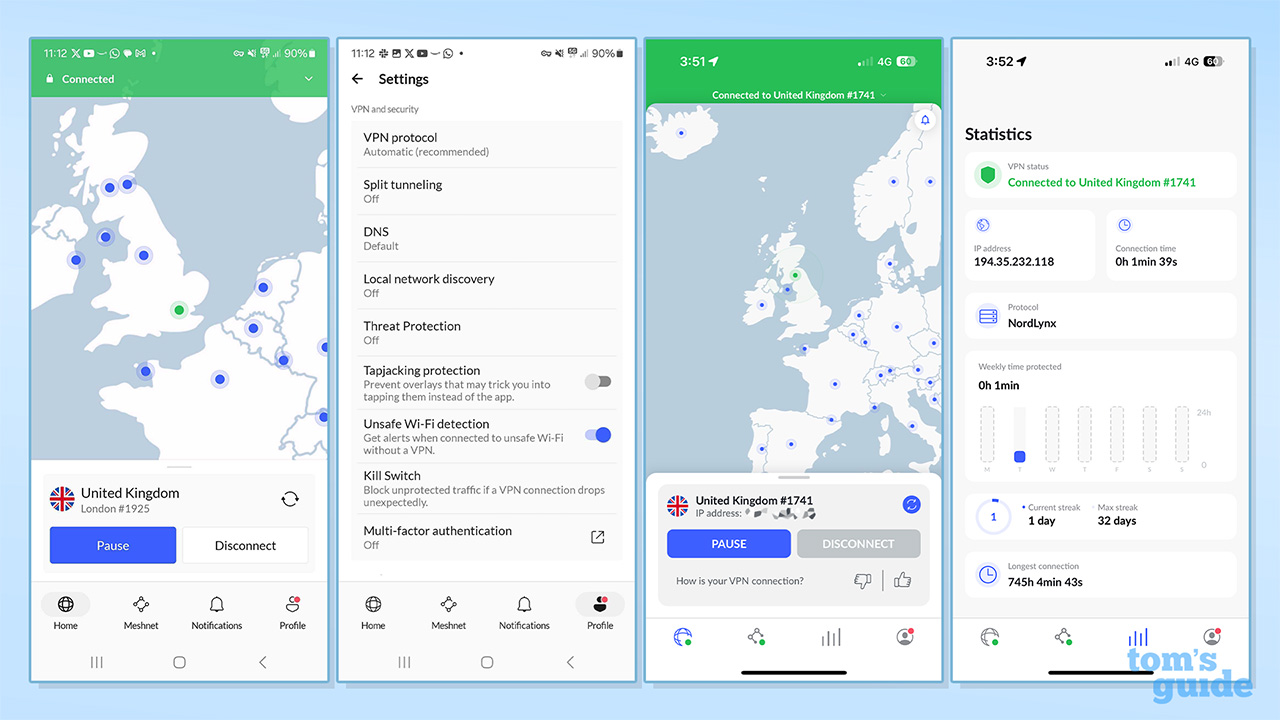
NordVPN's mobile VPN apps are fairly similar to the desktop versions – and here it's a little easier to see the drawbacks of the map-based interface. Scrolling the map is an awkward experience, and if we wanted to connect to a server outside the default framing of the map, we found it much easier to just find the country in the server list.
Thankfully, this isn't too difficult, and doesn't hold the mobile version back too much.
On other platforms, the simpler apps aren't as attractive, but they are easier to use. For example, on Fire Stick and Apple TV, the map would be hell to navigate with a remote. The scrollable flags are far easier, and a wise choice.
Overall, NordVPN isn't the easiest VPN to use, but most people who have used a computer or mobile device before shouldn't have any issues getting to grips with it.
Rating: 8/10
Why is NordVPN based in Panama?
I mentioned earlier that NordVPN is "based in Lithuania, but operates out of Panama," and there's a good reason for this. Besides any potential tax benefits, having Panama listed as NordVPN's base means that it is not subject to the strict data collection and retention laws that are found in the EU, US, and many other jurisdictions.
This means that NordVPN can collect less data from its users while staying within the law, in turn allowing a stronger no-logs policy, and a more private service overall. Many other VPNs engage in the same practice – ExpressVPN is based in the British Virgin Islands, for example – and it's a net gain for the customer.
NordVPN review: history and the future
Historically, NordVPN has been a very reliable service, with few major incidents affecting its users. Looking at customer satisfaction websites like Trustpilot can give a reasonable idea of a company's reputation, and NordVPN's 4.2/5 score is very good – especially when you consider those leaving negative reviews are often a vocal minority.
That's not to say that NordVPN has a perfect record. Long-time privacy advocates may remember 2018's server breach – outlined comprehensively by our friends at TechRadar – which was made even more awkward due to the time it took Nord to acknowledge this.
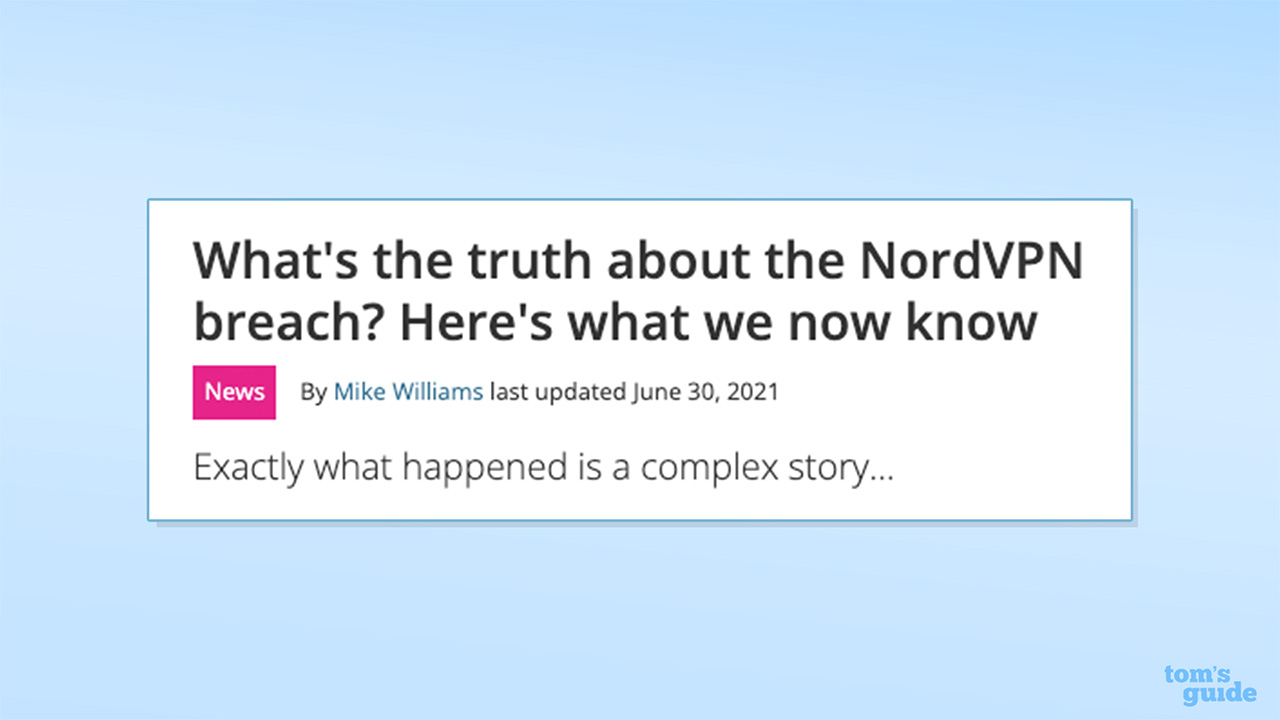
However, that was over six years ago, and since then we've seen no evidence of any other privacy issues at all. In fact, this event kickstarted NordVPN's commitment to independent audits and a movement towards RAM-only servers, which are both good things.
Post-quantum protection is something that many VPN providers are looking into with some urgency. While not a current threat, "store now, decrypt later" attacks will be possible in the future, so VPNs taking an interest in this is important. NordVPN has not yet implemented any post-quantum protections – some rivals like ExpressVPN and Windscribe have – but I have spoken to the development team, and it's something they are working on. I'll update this review when we get more information on this topic.
Something I've written about before is the fact that VPNs are trying to do everything nowadays, and NordVPN arguably started the trend. Not satisfied with just providing a VPN, Nord Security has developed a wide suite of privacy products like NordPass, NordLocker, and more. This move towards a wider range of products in the same ecosystem is growing, and from speaking to many different providers – NordVPN included – the market has responded well. Expect to see NordVPN continue diversifying its offering.
Rating: 8/10
NordVPN review: customer support
Under the hood, VPNs are very complex, and as such there can occasionally be issues when using them, no matter how reliable and well-built the applications are. What really matters is having quality support that's accessible and easy to explore.
NordVPN offers plenty of resources for its subscribers, with the first port of call being written articles outlining common issues and setup advice. The knowledgebase isn't the most logically laid out, and it can take a bit of searching to find the information you need, but the articles themselves are well-written and answer tons of questions simply and effectively.
Customer support agents are universally friendly and knowledgeable, giving actionable advice that anyone can understand.
Should you prefer a conversation, there's a chatbot which can help you find the required information, though many people will head through to the live chat immediately afterwards. This is manned 24/7 by humans, and the response time is typically well under a minute. When we posed them some questions, they were universally friendly and knowledgeable, giving actionable advice that anyone could understand.
Finally, there's also email support, which might be a better option if you have an in-depth question, or you're looking for more expert-level advice. When we sent them a query, it only took about a quarter of an hour to get a useful response, and follow-ups were near-instantaneous.
All that's missing is telephone support, but this is very rare these days – the only VPN provider I can think of that does offer this is IPVanish. I don't feel like this is worth marking NordVPN down on, and overall, customer support is very good.
Rating: 10/10
NordVPN review: final verdict
NordVPN | $3.09 per month | 24-month plan
NordVPN lives up to the expectations that come with being the best-known VPN in the world. If you're looking for a versatile VPN that offers both excellent privacy, and extras like unblocking streaming sites and malware protection, it's your best choice out of all the competition, and higher tiers of subscription also offer interesting additional features.
It's not the simplest VPN to use, with apps that may overwhelm beginners, and it's not the absolute best choice when it comes to torrenting – although it still serves this purpose very well. However, the software is generally logical to use, connection speeds are excellent, and as a package it's the best VPN for most people available right now.
Final rating: 90.5/100
Subscribe if:
✅ Streaming and Netflix is your top priority. NordVPN leads the pack when it comes to unblocking global Netflix libraries, and is capable of getting access to almost every other streaming site in the world.
✅ You want a full privacy suite beyond a VPN. With malware detection and ad-blocking coming free of charge, and extras like NordLocker and NordPass available as add-ons, Nord as a whole can cover almost every aspect of your online privacy and security.
✅ You want bang for your buck. NordVPN certainly isn't the cheapest, but when you consider what you get, it's great value.
Don't subscribe if:
❌ Simple apps are your jam. Nord's apps are powerful, but they can be a little complex to use.
❌ You're a hardcore torrenter. Again, NordVPN is perfectly capable of torrenting, but if you're sharing P2P all day, I recommend a provider like ExpressVPN or Private Internet Access.
Alternatives to NordVPN
I've written at length about NordVPN alternatives. In short, though, if there's something you need that NordVPN doesn't offer, there are a few other excellent VPN services that might fit the bill.
ExpressVPN: the best VPN for beginners
ExpressVPN is arguably NordVPN's biggest rival, and if you're looking for VPN apps that are very simple and incredibly reliable, it's probably a better choice. It's great for streaming, its privacy credentials are all fully audited, and it's also a little better on mobile than Nord. However, with prices starting from $6.67 per month, it's also more expensive, and NordVPN offers a number of extra features that ExpressVPN doesn't.
Surfshark: the best cheap VPN
If you're on a budget, Surfshark is a very worthy alternative to NordVPN. Owned by the same parent company, it offers similar protection in a simpler, cheaper package. Surfshark also offers a few features that NordVPN doesn't, like Alternative ID, and it's also the fastest VPN we've ever tested. Prices start at less than $2.50 per month, and there's a 30-day money-back guarantee.
Private Internet Access: the best VPN for torrenting
PIA is another cheap provider that punches well above its weight, and if you're looking for a VPN for the sole reason of staying safe when torrenting, it could be a better choice. With advanced features like port forwarding you can tailor your setup in much more detail, but this does come at the expense of ease of use, making PIA less user-friendly than Nord, Express, or Surfshark. Prices start from $2.03 per month, and there's a 30-day money-back guarantee here, too.
NordVPN review: FAQ
How to cancel NordVPN
If you're looking to make use of NordVPN's 30-day free trial, it's not too tricky to cancel and get your refund. The easiest way to do this is to log into you Nord account, and contact a support agent through live chat. They'll try to get you to stay on, but it's fairly painless to persist and get your refund.
Does NordVPN work in China?
As one of the best China VPNs, NordVPN has a decent history of unblocking the open and free internet in the country. However, as with almost all VPNs, it has been known to be unreliable when trying to get around the Great Firewall, so take precautions if you're heading there for a visit.
Who owns NordVPN?
NordVPN is owned by Nord Security, the parent company that also owns NordPass, NordLocker, NordStellar, NordLayer, and eSIM provider Saily. Nord Security in based in Lithuania, and is also linked to Lithuanian business incubator Tesonet. In 2022, Nord Security also merged with VPN rival Surfshark, bringing two of the biggest players in the game under the same roof.
Feature | Comments | Rating |
|---|---|---|
Design | Fun interface but might seem a little crowded for some users | ⭐⭐⭐⭐ |
Ease of use | Though simple to use, the map-like design might not work for everyone | ⭐⭐⭐⭐ |
Performance | One of the fastest with an average speed of 950 Mbps | ⭐⭐⭐⭐⭐ |
Unblocking | Effortlessly unblocks most content streaming platforms | ⭐⭐⭐⭐⭐ |
Security and privacy | Strong encryption with additional features like Threat Protection for safe streaming | ⭐⭐⭐⭐⭐ |
Customer support | Reliable 24/7 customer support | ⭐⭐⭐⭐⭐ |
Price | Provides ample value for the price. | ⭐⭐⭐⭐ |
How we test VPNs
Understanding how our team of experts tests VPNs is important. It lets you know that we really have got hands-on with these products, and that we’ve considered every feature, no matter how small. Some sites just give a rundown of specs found on a provider’s website – we endeavor to do quite a bit more than that.
First of all, we do check the provider websites, and note useful information like the number of servers and locations, whether you’re allowed to use every server for P2P, which encryption protocols are supported, the variety of operating systems it runs on, and tons more. We also check the pricing at this stage.
This initial scan gives us a baseline understanding of the service, and if there are any bold claims on-site we note them to make sure the customer isn’t being misled.
We’ll then dig into privacy policies. This is a very important piece of literature for any company, but for VPNs they need to be absolutely watertight. We’ll also go through the logging or zero-logging policy to look for gaps, and read any information available on independent audits.
Then it comes to testing the applications themselves. We test how easy it is to download and install, noting if any data collection options are clearly outlined to the user. We then inspect the default configuration to see what you have to ‘opt in’ for, and what features are available overall. We then play around with any additional features, such as ExpressVPN’s server speed test or NordVPN’s Double VPN. After we’ve gone through everything on the surface, the fun bit starts – trying to break things.
We throw all sorts of curveballs at these VPNs, like connecting to oddly configured networks, and killing processes to see if we can get the VPN to stop without activating the kill switch.
After we’ve had our fun, we check in with the support team to see if they’re helpful. Then, we’ll check a wide range of streaming sites to see if the VPN is able to access geo-blocked content, and we’ll run a series of speed tests over a few days and nights to get an accurate picture of what sort of connection speeds you can expect.
Disclaimer
We test and review VPN services in the context of legal recreational uses. For example: 1. Accessing a service from another country (subject to the terms and conditions of that service). 2. Protecting your online security and strengthening your online privacy when abroad. We do not support or condone the illegal or malicious use of VPN services. Consuming pirated content that is paid-for is neither endorsed nor approved by Future Publishing.

Mo has been rigorously testing, reviewing, and analyzing VPN services at Tom’s Guide for more than five years. He heads up the three-person Tom's Guide VPN team, and is passionate about accessibility: he believes that online privacy should be an option that’s available to everyone. NordVPN and ExpressVPN are the products he uses most on a daily basis, but he experiments weekly with all the top services, evaluating their privacy features, connection speeds across various protocols, and server reliability – among other things – so that he can make confident VPN recommendations that are backed by data. To see his latest advice, head over to Tom’s Guide’s best VPN and best free VPN guides.
You must confirm your public display name before commenting
Please logout and then login again, you will then be prompted to enter your display name.
